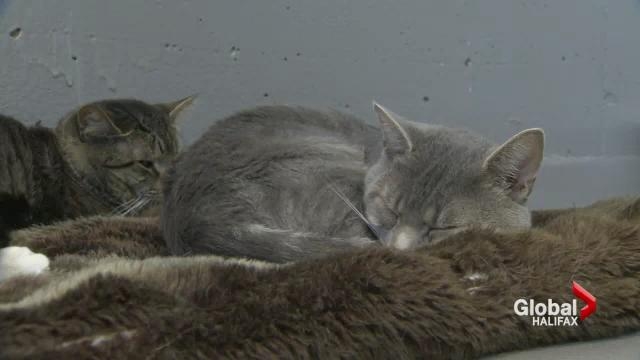Nova Scotia has become the first province to ban medically unnecessary cat declawing, part of a worldwide movement against the practice.

The Nova Scotia Veterinary Medical Association decided Tuesday to amend its code of ethics to make the practice of elective and non-therapeutic declawing ethically unacceptable.
It will come into effect on March 15, 2018, following a three-month education period.
READ MORE: Halifax vets call for ban on ‘unethical’ declawing procedure
Dr. Frank Richardson, registrar of the association, said the decision follows years of discussion by veterinarians, surveys, public input, and a recent statement from the national association.
The Canadian Veterinary Medical Association strengthened its stand against declawing domestic cats in March, saying the practice causes unnecessary and avoidable pain.
Vets’ groups in many other provinces are having active discussions on the issue, Richardson said: “It’s on everybody’s radar.”
Richardson said while declawing was popular 20 years ago, fewer and fewer veterinarians have been willing to perform the procedure.

Get weekly health news
“The number is getting smaller and smaller each year. I think if we did nothing it would die off on its own,” he said.
WATCH: Halifax vets call for ban on ‘outdated, unnecessary’ declawing

Dr. Hugh Chisholm, a retired veterinarian who has been pushing for the change, said while some municipalities have enacted regulations against declawing, Nova Scotia becomes the first province or state in North America to declare the practice unethical.
“It’s a great day. I’m so proud of the Nova Scotia Veterinary Medical Association,” said Chisholm, Atlantic Canada director for the Paw Project.
“You are amputating 10 bones from 10 digits on the paws of a cat, and if that doesn’t constitute mutilation, I don’t know what does,” he said.
READ MORE: Cat declawing ban spreads across the U.S. But it’s still allowed in Canada
The practice has already been banned in the U.K., Europe, Australia and several California cities. New Jersey is considering a law that would ban the practice unless a vet decides the operation is medically necessary.
“Now that we have this success in Nova Scotia, I will be contacting the other provincial veterinary associations to encourage them to do the same thing. I think it’s just a matter of time,” Chisholm said.
For years some pet owners have had their cats declawed to prevent scratches to furniture, people and other pets. But the Canadian Veterinary Medical Association says scratching is normal behaviour that cats use to mark territory, help with balance, climb and defend themselves.
Chisholm said there will still be cases where declawing will be medically necessary.
“Those would be very rare cases, but yes if it is in the cat’s best interest to have a claw removed or a few claws removed because of trauma or infection, then yes it is the right thing to do. To do it because you’re worried your sofa is going to get picked or scratched is just wrong,” Chisholm said.







Comments